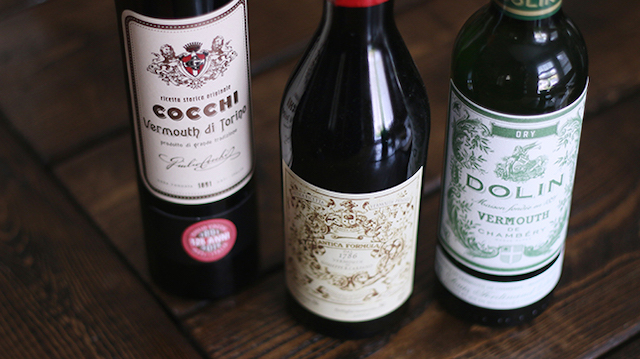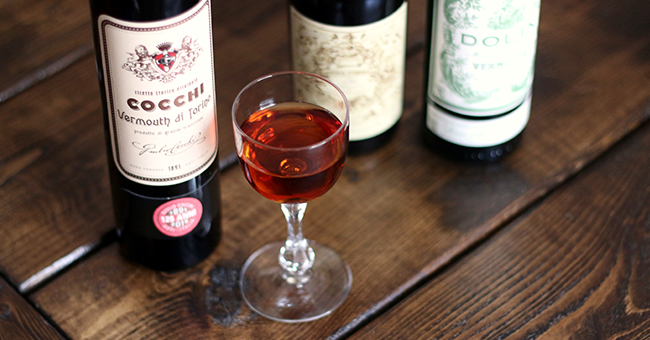When it comes to alcoholic beverages, vermouth is one of the oldest players in the game. Even so, it is an often misunderstood ingredient, especially in the U.S., where it’s often been relegated to a dusty shelf on the back bar or tucked away in a cooler. More than just a companion to a martini or one leg of a Negroni, vermouth is a versatile, delicious drink that can be enjoyed in myriad ways. Its obscure background is extensive and rife with misconceptions. There are plenty of common misunderstandings about vermouth, which can affect its use behind the bar. We spoke to two vermouth aficionados to set the record straight.
Myth #1: Vermouth is a liqueur.
To be more exact, vermouth is a fortified wine infused with various botanicals. Vermouth comes in three main varieties: sweet (also known as rosso or red), dry and bianco (also known as blanc). The wines are usually fortified with a grape spirit like brandy before herbs and spices are added to give the vermouth its signature bitter flavor. Sweet vermouth also usually contains added sugar syrup. Accomplished spirit writer and vermouth expert Giuseppe Gallo explains that European Union law dictates that a bottle must be at least 75% wine to be considered vermouth. Classified as an aperitif wine, it’s original purpose was to stimulate the appetite for the meal ahead.
Myth #2: Vermouth was invented by Antonio Benedetto Carpano.
While the invention of vermouth is typically attributed to Antonio Benedetto Carpano in 1786, Gallo clarifies that Carpano was perhaps “the first one to trade vermouth, although the drink was already popular amongst local farmers and people in Piemonte.” To that end, Italians weren’t the only ones drinking vermouth; the dry style was quite popular in France in the 1700s. There is also evidence to suggest, however, that vermouth existed even before that.
Myth #3: The Italians were the first to make vermouth.
Hippocrates, the father of modern medicine, is likely also the father of vermouth. Francois Monti, acclaimed spirit expert and author of “El Gran Libro del Vermut” explains that the herb-infused “wormwood wine” Hippocrates would serve his patients was quite possibly the earliest form of vermouth. Prescribed for everything from jaundice to menstrual pains, vermouth was believed to aid many illnesses and was also commonly used as an antidote against poisonous mushrooms and hemlock.
 Making the best use of vermouth stems from understanding the spirit.
Making the best use of vermouth stems from understanding the spirit.
Myth #4: Vermouth is just another term for aromatized wine.
As mentioned above, the original botanical that characterized vermouth was wormwood. In fact, the word vermouth is derived from the German word “wermut” meaning wormwood. Now, due to the controversy surrounding wormwood, many vermouth companies either leave it out completely or downplay its role in the drink. Monti argues that “what sets vermouth apart from other aromatized wine is, precisely, the central use of wormwood.”
Myth #5: All sweet vermouth is made from red wine.
Surprisingly enough, all vermouth shares a white wine base. Gallo explains that rosso gets its coloring from caramel rather than red wine, as is commonly believed. In fact, quality white wines are actually not preferred for vermouth-making, as Gallo adds, “a standard trebbiano is much better for making vermouth.” The Italians are typically attributed with inventing the sweet variety of vermouth, while the French are known for inventing the dry, but both types begin with the same base — an inexpensive white table wine.
Myth #6: Vermouth doesn’t go bad.
Because it’s a wine, vermouth will expire. Most experts agree that it should be stored in the fridge once opened. It’s best enjoyed 4-5 weeks after opening, although Monti insists that oxidation isn’t always such a bad thing and that a quality vermouth can last even longer. According to Monti, “vermouths that went through an oxidative process, such as Noilly Prat or quite a few Spanish brands, will survive beyond the 2 to 3 weeks fundamentalists tend to quote.” Unopened, vermouth can last up to a decade if stored properly.
Myth #7: Sweet vermouth is the most popular style.
According to Gallo, the most popular style of vermouth is neither sweet nor dry, but bianco, also known as blanc. Monti adds that there is a perception of bianco as sweeter than the red variety, but he explains that is just tastes sweeter. In content, rosso and bianco contain the same amount of sugar but bianco lacks the same amount of bitter ingredients to cut through the sweetness. Monti recommends pairing the blanc variety with tequila or pisco for a well balanced cocktail.
Myth #8: Vermouth is only good for making martinis.
While Americans typically dismiss vermouth as something you only drink in a Manhattan or a Negroni, Europeans drink vermouth on its own as an aperitif or after a meal. A quality vermouth is best enjoyed over ice or slightly chilled. It’s said to aid in the digestive process similar to amaro, but it’s not nearly as bitter. Monti, who lives in Spain, explains that there is a current trend in Europe to drink vermouth after exercise, as if it is somehow healthier for its digestive benefits. Monti explains that this is pure fiction. Vermouth contains a sizable amount of sugar; a single serving contains more sugar than a Coke.
Myth #9: A dry martini means less vermouth.
Americans are well-known for our peculiar martini preferences. Bartenders are no stranger to requests for bone-dry martinis. What guests are really asking for is chilled vodka or gin, with either very little vermouth or none at all. What most people don’t know is that a dry martini doesn’t mean less vermouth, it actually means a martini made with dry vermouth. Over time the meaning has evolved to fit the patrons’ understanding of “dry,” but originally a dry martini was named for the type of vermouth used in it.





